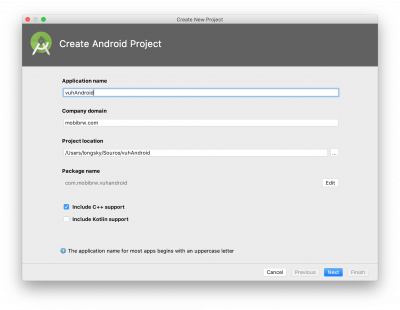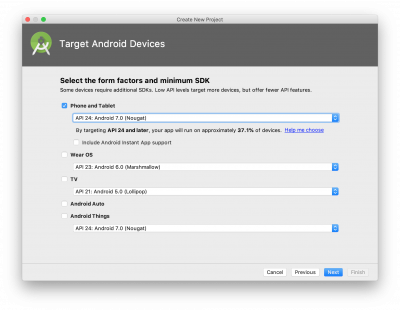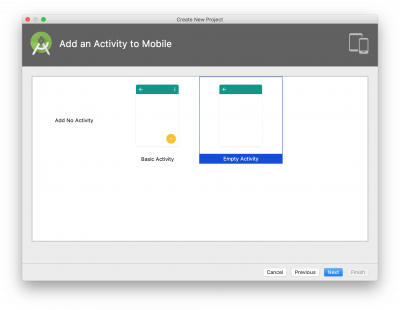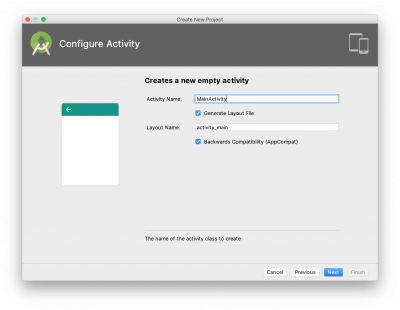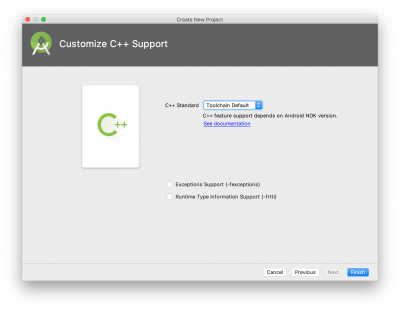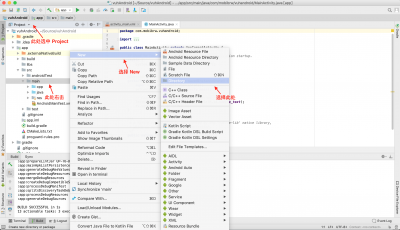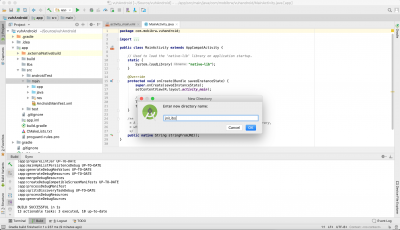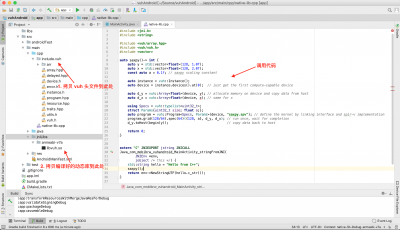Android Studio 3.2.1 上 vuh 库使用的例子,首先使用 基于Vulkan的GPGPU计算框架Vuh 编译出 Android 版本的动态库,然后依照如下步骤建立工程。
工程中几处关键的代码如下:
CMakeLists.txt
Vim
|
1 2 3 4 5 6 7 8 9 10 11 12 13 14 15 16 17 18 19 20 21 22 23 24 25 26 27 28 29 30 31 32 33 34 35 36 37 38 39 40 41 42 43 44 45 46 47 48 49 50 51 52 53 54 55 56 57 58 59 60 61 62 |
# For more information about using CMake with Android Studio, read the # documentation: https://d.android.com/studio/projects/add-native-code.html # Sets the minimum version of CMake required to build the native library. cmake_minimum_required(VERSION 3.4.1) # for Vulkan add_definitions(-DVK_USE_PLATFORM_ANDROID_KHR=1 -DVULKAN_HPP_TYPESAFE_CONVERSION=1) include_directories(src/main/cpp/include) include_directories(${ANDROID_NDK}/sources/third_party/vulkan/src/include/) add_library(vuh SHARED IMPORTED) set_target_properties(vuh PROPERTIES IMPORTED_LOCATION ${CMAKE_SOURCE_DIR}/src/main/jniLibs/${ANDROID_ABI}/libvuh.so) add_library(vulkan SHARED IMPORTED) set_target_properties(vulkan PROPERTIES IMPORTED_LOCATION ${ANDROID_NDK}/platforms/${ANDROID_PLATFORM}/arch-arm/usr/lib/libvulkan.so) # Creates and names a library, sets it as either STATIC # or SHARED, and provides the relative paths to its source code. # You can define multiple libraries, and CMake builds them for you. # Gradle automatically packages shared libraries with your APK. add_library( # Sets the name of the library. native-lib # Sets the library as a shared library. SHARED # Provides a relative path to your source file(s). src/main/cpp/native-lib.cpp) # Searches for a specified prebuilt library and stores the path as a # variable. Because CMake includes system libraries in the search path by # default, you only need to specify the name of the public NDK library # you want to add. CMake verifies that the library exists before # completing its build. find_library( # Sets the name of the path variable. log-lib # Specifies the name of the NDK library that # you want CMake to locate. log android) # Specifies libraries CMake should link to your target library. You # can link multiple libraries, such as libraries you define in this # build script, prebuilt third-party libraries, or system libraries. target_link_libraries( # Specifies the target library. native-lib vulkan vuh # Links the target library to the log library # included in the NDK. ${log-lib}) |
build.gradle
Vim
|
1 2 3 4 5 6 7 8 9 10 11 12 13 14 15 16 17 18 19 20 21 22 23 24 25 26 27 28 29 30 31 32 33 34 35 36 37 38 39 40 |
apply plugin: 'com.android.application' android { compileSdkVersion 28 defaultConfig { applicationId "com.mobibrw.vuhandroid" minSdkVersion 24 targetSdkVersion 28 versionCode 1 versionName "1.0" testInstrumentationRunner "android.support.test.runner.AndroidJUnitRunner" externalNativeBuild { cmake { cppFlags "-std=c++14 -v -g" abiFilters "armeabi-v7a" } } } buildTypes { release { minifyEnabled false proguardFiles getDefaultProguardFile('proguard-android.txt'), 'proguard-rules.pro' } } externalNativeBuild { cmake { path "CMakeLists.txt" } } } dependencies { implementation fileTree(dir: 'libs', include: ['*.jar']) implementation 'com.android.support:appcompat-v7:28.0.0' implementation 'com.android.support.constraint:constraint-layout:1.1.3' testImplementation 'junit:junit:4.12' androidTestImplementation 'com.android.support.test:runner:1.0.2' androidTestImplementation 'com.android.support.test.espresso:espresso-core:3.0.2' } |
MainActivity.java
Java
|
1 2 3 4 5 6 7 8 9 10 11 12 13 14 15 16 17 18 19 20 21 22 23 24 25 26 27 28 29 30 31 32 |
package com.mobibrw.vuhandroid; import android.support.v7.app.AppCompatActivity; import android.os.Bundle; import android.view.View; import android.widget.Button; import android.widget.TextView; public class MainActivity extends AppCompatActivity { // Used to load the 'native-lib' library on application startup. static { System.loadLibrary("vuh"); System.loadLibrary("native-lib"); } @Override protected void onCreate(Bundle savedInstanceState) { super.onCreate(savedInstanceState); setContentView(R.layout.activity_main); // Example of a call to a native method TextView tv = (TextView) findViewById(R.id.sample_text); tv.setText(stringFromJNI()); } /** * A native method that is implemented by the 'native-lib' native library, * which is packaged with this application. */ public native String stringFromJNI(); } |
native-lib.cpp
C++
|
1 2 3 4 5 6 7 8 9 10 11 12 13 14 15 16 17 18 19 20 21 22 23 24 25 26 27 28 29 30 31 32 33 34 35 36 |
#include <jni.h> #include <string> #include <vuh/array.hpp> #include <vuh/vuh.h> #include <vector> auto saxpy()-> int { auto y = std::vector<float>(128, 1.0f); auto x = std::vector<float>(128, 2.0f); const auto a = 0.1f; // saxpy scaling constant auto instance = vuh::Instance(); auto device = instance.devices().at(0); // just get the first compute-capable device auto d_y = vuh::Array<float>(device, y); // allocate memory on device and copy data from host auto d_x = vuh::Array<float>(device, x); // same for x using Specs = vuh::typelist<uint32_t>; struct Params{uint32_t size; float a;}; auto program = vuh::Program<Specs, Params>(device, "saxpy.spv"); // define the kernel by linking interface and spir-v implementation program.grid(128/64).spec(64)({128, a}, d_y, d_x); // run once, wait for completion d_y.toHost(begin(y)); // copy data back to host return 0; } extern "C" JNIEXPORT jstring JNICALL Java_com_mobibrw_vuhandroid_MainActivity_stringFromJNI( JNIEnv *env, jobject /* this */) { std::string hello = "Hello from C++"; saxpy(); return env->NewStringUTF(hello.c_str()); } |
点击此处下载完整的工程 vuhAndroid
